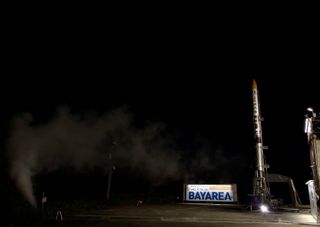Japan's Interstellar Technologies fails to reach space with private rocket launch
The sounding rocket Momo-F5 crashed into the ocean instead.

The Japanese space start-up Interstellar Technologies failed to reach space with its latest small rocket launch early Sunday (June 14).
The crowdfunded sounding rocket, called Momo-F5, lifted off from a pad in Taiki Town, Hokkaido at 5:15 a.m. JST on Sunday (4:15 p.m. EDT on Saturday, June 13). Shortly after liftoff, the rocket suffered an anomaly, forcing Interstellar Technologies to issue an abort command that sent the booster crashing into the Pacific Ocean.
Interstellar Technologies representatives said they terminated the launch about 70 seconds after liftoff once it became clear the Momo-F5 rocket had suffered a failure, according to a Google translation of a report to crowdfunding supporters on the Japanese website Campfire. About 36 seconds after liftoff, debris was spotted falling from the rocket's engine nozzle, they added.
Related: Watch Interstellar Technologies' 1st launch success (Video)
You can watch a video of the launch from NVS-Neko Video Visual Solutions and the Tokachi Mainichi newspaper below. The debris event is visible from the ground as a brief flash near the engine after liftoff.
Momo-F5 reached a maximum altitude of 7.1 miles (11.5 kilometers), well short of its goal of 62 miles (100 km), an altitude recognized as the boundary of space. It crashed into the Pacific Ocean just over 2 miles (4 km) offshore.
As its name suggests, Momo-F5 is the fifth sounding rocket built by Interstellar Technologies, which aims to build affordable rockets to "make space more accessible," according to a statement. It stands 32 feet (10 meters) tall and weighs about 1 metric ton. The company has launched one successful mission, the Momo-F3 rocket flight of May 2019, out of its five to date.
Get the Space.com Newsletter
Breaking space news, the latest updates on rocket launches, skywatching events and more!
Interstellar Technologies used the Campfire crowdfunding site to raise $391,000 (42 million yen) for the Momo-F5 launch, well above the mission's goal of nearly $84,000 (9 million yen). The mission was named for the book "Poupelle of Chimney Town" by Akihiro Nishino.
In their Campfire mission update, Interstellar Technologies thanked backers for their support and for not trying to watch the launch in person. The company had asked spectators to stay home to help prevent spreading the coronavirus amid the ongoing pandemic.
A new Momo rocket is already under construction, they added. Interstellar Technologies is also developing an orbital rocket called Zero.
The Momo-F5 launch was the third of three private rocket missions to launch from three different countries in 24 hours this weekend. The US company Rocket Lab launched an Electron booster carrying five small satellites into orbit from New Zealand's Mahia Peninsula early Saturday morning (June 13). SpaceX, another U.S. company, also launched a Falcon 9 rocket on Saturday to deliver a fleet of Starlink and Earth-imaging Starlink satellites into orbit.
- Japan Taps Toyota to Build Futuristic Moon Rover
- Japanese Space Capsule Prototype Survives Fiery Fall to Earth
- Japanese Company Raises Record $90 Million for Moon Missions
Email Tariq Malik at tmalik@space.com or follow him @tariqjmalik. Follow us @Spacedotcom, Facebook and Instagram.
OFFER: Save 45% on 'All About Space' 'How it Works' and 'All About History'!
For a limited time, you can take out a digital subscription to any of our best-selling science magazines for just $2.38 per month, or 45% off the standard price for the first three months.
Join our Space Forums to keep talking space on the latest missions, night sky and more! And if you have a news tip, correction or comment, let us know at: community@space.com.

Tariq is the Editor-in-Chief of Space.com and joined the team in 2001, first as an intern and staff writer, and later as an editor. He covers human spaceflight, exploration and space science, as well as skywatching and entertainment. He became Space.com's Managing Editor in 2009 and Editor-in-Chief in 2019. Before joining Space.com, Tariq was a staff reporter for The Los Angeles Times covering education and city beats in La Habra, Fullerton and Huntington Beach. In October 2022, Tariq received the Harry Kolcum Award for excellence in space reporting from the National Space Club Florida Committee. He is also an Eagle Scout (yes, he has the Space Exploration merit badge) and went to Space Camp four times as a kid and a fifth time as an adult. He has journalism degrees from the University of Southern California and New York University. You can find Tariq at Space.com and as the co-host to the This Week In Space podcast with space historian Rod Pyle on the TWiT network. To see his latest project, you can follow Tariq on Twitter @tariqjmalik.

